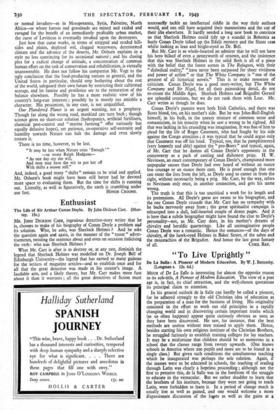Enthusiast
The Life of Sir Arthur Conan Doyle. By John Dickson Carr. (Mur- ray. 18s.)
MR. JOHN DICKSON CARR, ingenious detective-story writer that he is, chooses to make of his biography of Conan Doyle a problem and its solution. Who, he asks, was Sherlock Holmes ? And he asks the question again and again, in the manner of the " teaser " adver- tisements, twisting the sentence about and even on occasion italicising the verb : who was Sherlock Holmes ?
What Mr. Carr is after is to destroy or, at any rate, diminish the legend that Sherlock Holmes was modelled on Dr. Joseph Bell of Edinburgh University—the legend that has earned so many guineas for the writers of magazine articles—and to establish once and for all that the great detective was made in his creator's image. A laudable aim, and a likely theory, but Mr. Carr makes more fuss about it than it warrants ; all the great detectives of fiction must necessarily tackle an intellectual riddle in the way their authors would, and can still have acquired their mannerisms and the cut of their jibs elsewhere. It hardly needed a long new book to convince us that Sherlock Holmes could tidy up a scandal in Bohemia as burly Conan Doyle tidied up the Edalji mystery and the Slater case whilst looking as lean and bright-eyed as Dr. Bell.
But Mr. Carr is so whole-hearted an admirer that he will not have his hero bilked of even a pennyworth of renown, and the insistence that this was Sherlock Holmes in the solid flesh is all of a piece with the belief that the forest scenes in The Refugees, with their " diabolical reality," " have never been surpassed for sheer vividness and power of action" or that The White Company is "one of the greatest of all historical novels." This is to make nonsense of criticism. Conan Doyle was a good story-writer, but The White Company and Sir Nigel, for all their painstaking detail, do not re-create the Middle Ages. Sherlock Holmes and Brigadier Gerard are splendid creations, but we do not rank them with Lear. Mr. Carr writes as though he does.
Conan Doyle's parents were both Irish Catholics, and there was Scots blood, too, on his mother's side. But he was John-Bull-English himself, in his bulk, in the uneasy mixture of common sense and romanticism, in his tenacity when he saw a wrong to be righted. All that was lacking in his crusading was imagination. It was fine of him to plead for the life of Roger Casement, who had fought by his side against the Congo atrocities ; it was typical that he could argue only that Casement was off his head. Typical, too, that he pamphleteered (very honestly and ably) against the " pro-Boers " and typical, again, of Mr. Carr that he damns all Conan Doyle's opponents in the controversy as a pack of canting and dishonest prigs. H. W. Nevinson, an exact contemporary of Conan Doyle's, championed more unpopular causes than Doyle had ever heard of without an ounce less courage or an ounce more cant. He is proof enough that one can enter the lists from the left, as Doyle used to canter in from the right, without necessarily being a prig. Mr. Carr, by the way, refers to Nevinson only once, in another connection, and gets his name wrong.
The truth is that this is too uncritical a work for its length and its pretensions. All Doyle's geese are swans to his biographer, and the one Conan Doyle crusade that Mr. Carr has no sympathy with he backs nervously away from ; the great spiritualist campaign is telescoped into a dull, half-hearted couple of dozen pages. And it is here that a subtle biographer might have found the clue to Doyle's personality—not, as Mr. Carr does, in his mother's dreams of chivalry and heraldic quarterings. Like all unimaginative people Conan Doyle was a romantic. Hence the romances—of the days of chivalry, of the hawk-eyed Holmes in Baker Street, of the sabre and the moustachios of the Brigadier. And hence the last great fantasy






































 Previous page
Previous page